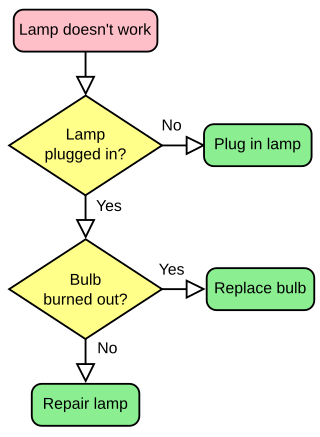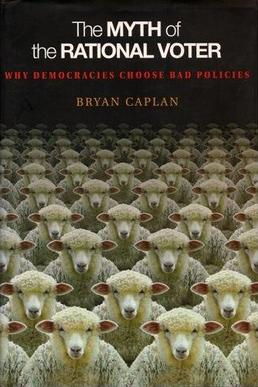Public choice, or public choice theory, is "the use of economic tools to deal with traditional problems of political science." Its content includes the study of political behavior. In political science, it is the subset of positive political theory that studies self-interested agents and their interactions, which can be represented in a number of ways—using standard constrained utility maximization, game theory, or decision theory. It is the origin and intellectual foundation of contemporary work in political economy.
Rationality is the quality of being guided by or based on reason. In this regard, a person acts rationally if they have a good reason for what they do, or a belief is rational if it is based on strong evidence. This quality can apply to an ability, as in a rational animal, to a psychological process, like reasoning, to mental states, such as beliefs and intentions, or to persons who possess these other forms of rationality. A thing that lacks rationality is either arational, if it is outside the domain of rational evaluation, or irrational, if it belongs to this domain but does not fulfill its standards.
The term Homo economicus, or economic man, is the portrayal of humans as agents who are consistently rational and narrowly self-interested, and who pursue their subjectively defined ends optimally. It is a wordplay on Homo sapiens, used in some economic theories and in pedagogy.
Behavioral economics is the study of the psychological, cognitive, emotional, cultural and social factors involved in the decisions of individuals or institutions, and how these decisions deviate from those implied by classical economic theory.
Independence of irrelevant alternatives (IIA), also known as binary independence, the independence axiom, is an axiom of decision theory and economics describing a necessary condition for rational behavior. The axiom says that a choice between and should not depend on the quality of a third, unrelated outcome .

In psychology, decision-making is regarded as the cognitive process resulting in the selection of a belief or a course of action among several possible alternative options. It could be either rational or irrational. The decision-making process is a reasoning process based on assumptions of values, preferences and beliefs of the decision-maker. Every decision-making process produces a final choice, which may or may not prompt action.

Decision theory is a branch of applied probability theory and analytic philosophy concerned with the theory of making decisions based on assigning probabilities to various factors and assigning numerical consequences to the outcome.

Buridan's ass is an illustration of a paradox in philosophy in the conception of free will. It refers to a hypothetical situation wherein an ass (donkey) that is equally hungry and thirsty is placed precisely midway between a stack of hay and a pail of water. Since the paradox assumes the donkey will always go to whichever is closer, it dies of both hunger and thirst since it cannot make any rational decision between the hay and water. A common variant of the paradox substitutes the hay and water for two identical piles of hay; the ass, unable to choose between the two, dies of hunger.
In economics, rationalization is an attempt to change a pre-existing ad hoc workflow into one that is based on a set of published rules. There is a tendency in modern times to quantify experience, knowledge, and work. Means–end (goal-oriented) rationality is used to precisely calculate that which is necessary to attain a goal. Its effectiveness varies with the enthusiasm of the workers for the changes being made, the skill with which management applies the rules, and the degree to which the rules fit the job.
Backward induction is the process of determining a sequence of optimal choices by reasoning from the endpoint of a problem or situation back to its beginning using individual events or actions. Backward induction involves examining the final point in a series of decisions and identifying the most optimal process or action required to arrive at that point. This process continues backward until the best action for every possible point along the sequence is determined. Backward induction was first utilized in 1875 by Arthur Cayley, who discovered the method while attempting to solve the secretary problem.
The Allais paradox is a choice problem designed by Maurice Allais to show an inconsistency of actual observed choices with the predictions of expected utility theory. Rather than adhering to rationality, the Allais paradox proves that individuals rarely make rational decisions consistently when required to do so immediately. The independence axiom of expected utility theory, which requires that the preferences of an individual should not change when altering two lotteries by equal proportions, was proven to be violated by the paradox.
In mathematics, an impossibility theorem is a theorem that demonstrates a problem or general set of problems cannot be solved. These are also known as proofs of impossibility, negative proofs, or negative results. Impossibility theorems often resolve decades or centuries of work spent looking for a solution by proving there is no solution. Proving that something is impossible is usually much harder than the opposite task, as it is often necessary to develop a proof that works in general, rather than to just show a particular example. Impossibility theorems are usually expressible as negative existential propositions or universal propositions in logic.
The lottery paradox arises from Henry E. Kyburg Jr. considering a fair 1,000-ticket lottery that has exactly one winning ticket. If that much is known about the execution of the lottery, it is then rational to accept that some ticket will win.
In game theory, the traveler's dilemma is a non-zero-sum game in which each player proposes a payoff. The lower of the two proposals wins; the lowball player receives the lowball payoff plus a small bonus, and the highball player receives the same lowball payoff, minus a small penalty. Surprisingly, the Nash equilibrium is for both players to aggressively lowball. The traveler's dilemma is notable in that naive play appears to outperform the Nash equilibrium; this apparent paradox also appears in the centipede game and the finitely-iterated prisoner's dilemma.

The Myth of the Rational Voter: Why Democracies Choose Bad Policies is a 2007 book by the economist Bryan Caplan, in which the author challenges the idea that voters are reasonable people whom society can trust to make laws. Rather, Caplan contends that voters are irrational in the political sphere and have systematically biased ideas concerning economics.
Logic-based therapy (LBT) is a modality of philosophical counseling developed by philosopher Elliot D. Cohen beginning in the mid-1980s. It is a philosophical variant of rational emotive behavior therapy (REBT), which was developed by psychologist Albert Ellis. A randomized, controlled efficacy study of LBT suggests that it may be effective in reducing anxiety.
The altruism theory of voting is a model of voter behavior which states that if citizens in a democracy have "social" preferences for the welfare of others, the extremely low probability of a single vote determining an election will be outweighed by the large cumulative benefits society will receive from the voter's preferred policy being enacted, such that it is rational for an “altruistic” citizen, who receives utility from helping others, to vote. Altruistic voting has been compared to purchasing a lottery ticket, in which the probability of winning is extremely low but the payoff is large enough that the expected benefit outweighs the cost.
In philosophy, Pascal's mugging is a thought experiment demonstrating a problem in expected utility maximization. A rational agent should choose actions whose outcomes, when weighted by their probability, have higher utility. But some very unlikely outcomes may have very great utilities, and these utilities can grow faster than the probability diminishes. Hence the agent should focus more on vastly improbable cases with implausibly high rewards; this leads first to counter-intuitive choices, and then to incoherence as the utility of every choice becomes unbounded.
Behavioral game theory seeks to examine how people's strategic decision-making behavior is shaped by social preferences, social utility and other psychological factors. Behavioral game theory analyzes interactive strategic decisions and behavior using the methods of game theory, experimental economics, and experimental psychology. Experiments include testing deviations from typical simplifications of economic theory such as the independence axiom and neglect of altruism, fairness, and framing effects. As a research program, the subject is a development of the last three decades.




